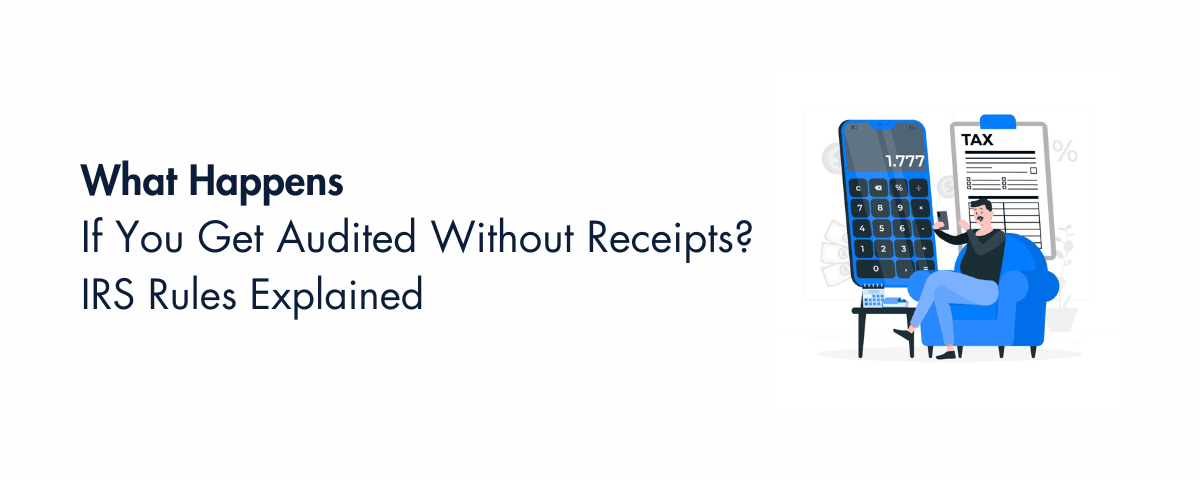You can rebuild proof, you can use acceptable substitutes, and in some situations a court may even allow reasonable estimates. The key is to act fast, stay organized, and know the rules that actually matter.
IRS audits start with a letter in the mail, not a surprise phone call or text. If you are being audited, the first contact arrives by mail with instructions and due dates. (irs.gov)
Table of Contents
- Key Takeaways
- Why The IRS Audits Taxpayers
- Types Of IRS Audits And How You’ll Be Notified
- What Happens If You Don’t Have Receipts
- How Far Back An Audit Can Go
- Extensions, When The Clock Can Be Lengthened
- What If You Ignore The Audit Letter
- The Strict Substantiation Categories You Cannot Wing
- What To Do If You’re Missing Receipts
- Common Questions About Receipts, Answered Briefly
- Possible Outcomes, Penalties, And Appeals
- Recordkeeping Best Practices To Prevent Future Issues
- FAQs
- When To Bring In Help
- Conclusion
Key Takeaways
- Missing receipts does not equal automatic failure. You can use bank and card statements, canceled checks, invoices, emails, calendars, mileage logs, and other credible records to back up expenses. Never mail originals, send copies.
- Some categories require strict proof under tax law. Travel, meals, gifts, and “listed property” like vehicles must meet special substantiation rules. Estimates alone do not satisfy these rules.
- Courts can allow reasonable estimates under the Cohan rule, but only when you first show the expense really happened and there is a basis to estimate. This does not override strict substantiation categories. (law.justia.com)
- Most audits look back up to three years, and can stretch to six years for substantial income omissions. Fraud or no return can mean no time limit. You may be asked to extend the deadline with Form 872.
- If you cannot substantiate deductions, the IRS can assess extra tax, interest from the original due date, and accuracy‑related penalties that often run at 20 percent. Appeals and Tax Court rights apply on specific timelines.
Why The IRS Audits Taxpayers
Audits exist to check return accuracy and keep the system fair. Your return can be selected by random statistical sampling, by computer screening that flags anomalies compared with similar returns, or because your return is related to someone else already under examination. Common triggers include unreported income, unusual or rounded deductions, and repeated business losses. High income, profitable businesses, and certain industries also attract more attention. (irs.gov)
Examiners focus on whether income is fully reported and whether deductions are properly documented. If your support is thin, they will ask for records that prove amounts, dates, business purpose, and who was involved.
Types Of IRS Audits And How You’ll Be Notified
You will learn about an audit by letter. That letter tells you which tax year is under review, what items are questioned, which documents the IRS wants, where to send them, and when they are due. The IRS initiates audits by mail, not by phone.
- Correspondence audit, by mail, usually focused on specific issues and documents.
- Office audit, an in‑person meeting at an IRS office.
- Field audit, an in‑person review at your home, business, or your tax pro’s office.
If the audit produces proposed changes, you typically get a 30‑day letter to agree or appeal. If you do not resolve it, the IRS can issue a statutory Notice of Deficiency, the 90‑day letter, which preserves your right to petition the U.S. Tax Court without paying first.
What to expect from the audit letter
- A list of exactly what to send, organized by item and year.
- A response deadline and a mailing or upload option, do not send originals.
- A contact or unit handling your case.
Pro tip, the IRS often accepts neatly organized digital copies, and for many correspondence exams you can upload through the IRS Document Upload Tool referenced in audit reconsideration guidance. Keep a complete copy of everything you send. (irs.gov)
What Happens If You Don’t Have Receipts
Short answer, you must reconstruct proof quickly. Start with bank and credit card statements, canceled checks, invoices, calendar entries, emails, mileage logs, travel itineraries, and vendor confirmations. For travel, meals, gifts, and vehicles, meet the stricter substantiation rules in the tax code, which ask for amount, time, place, business purpose, and business relationship. (law.cornell.edu)
Publication 463 explains when receipts are required and notes an exception for expenses under 75 for items other than lodging. Even with that exception, you still need to show the business purpose. For lodging, keep receipts regardless of amount.
If you must pay cash, document it on the spot. Save the receipt, add a brief note about who, what, when, where, and why, then match it to your bank withdrawal or petty cash log later. The IRS wants a complete, credible story that ties money paid to a clear business purpose.
Where Accountably fits, briefly
If you run a CPA, EA, or accounting firm, the fastest way to reduce audit pain for your clients is better documentation up front. Accountably’s offshore staffing and back‑office support can help you build audit‑ready workflows, naming conventions, and month‑end tie‑outs so your files are ready if a letter arrives. Use this kind of support where it is genuinely helpful, not as a sales step, to keep compliance tight and engagements efficient.
How Far Back An Audit Can Go
Most individual and small business audits cover the most recent returns, usually a three‑year lookback. If the IRS finds a substantial error, it can add years, and in many cases does not go back more than six years. Fraud or no return filed can remove the time limit altogether.
The Internal Revenue Code sets these timelines. A substantial omission of income, typically more than 25 percent of gross income reported, opens a six‑year assessment window under section 6501(e). Fraud, or a false return filed with intent to evade tax, has no statute of limitations.
At a glance, audit lookback rules
| Trigger | Lookback | What it means |
| Typical return | 3 years | Standard period to assess additional tax. |
| Substantial omission of income | 6 years | More than 25 percent of gross income omitted, special foreign asset omissions also apply. (irs.gov) |
| Fraud or false return | Unlimited | No time limit to assess. |
| No return filed | Unlimited | Assessment clock does not start. |
Extensions, When The Clock Can Be Lengthened
Sometimes the IRS asks you to extend the statute of limitations so both sides have more time. This is done with Form 872, Consent to Extend the Time to Assess Tax. You can refuse, limit it to certain issues, or limit it to a specific date. Know your rights before you sign.
Why agree to an extension at all? Two practical reasons. First, you may need extra time to rebuild records. Second, you may want to keep Appeals or settlement options open without forcing a rushed decision or a Notice of Deficiency. Publication 1035 explains the consent process in plain language.
You are allowed to negotiate scope and end date when you extend, for example limiting the consent to mileage and meals for 2023 only. Get that in writing on the form before signing.
What If You Ignore The Audit Letter
If you do not respond, the IRS completes the audit using what it has, then sends an audit report with proposed changes. If you still do not resolve it, the IRS can issue a 90‑day Notice of Deficiency, which starts your Tax Court window. Do not miss those timelines.
The 30‑day and 90‑day paths, in plain English
- 30‑day letter, you can agree or request IRS Appeals. The Appeals request must follow Publication 5 guidance, and you usually have 30 days from the letter date.
- 90‑day Notice of Deficiency, your ticket to Tax Court without paying first, but you must file within 90 days, or 150 days if addressed to you outside the U.S. (taxpayeradvocate.irs.gov)
The Strict Substantiation Categories You Cannot Wing
Tax law sets special proof rules for travel, meals, gifts, and listed property, vehicles for example. For these, you must document amount, time, place, business purpose, and business relationship with adequate records or sufficient corroborating evidence. Pure estimates will not do.
Publication 463 also explains when a receipt is not required for small items, typically under 75, other than lodging, but you still need credible evidence and a contemporaneous log or note. For lodging, always keep receipts. (irs.gov)
Quick filter for your files, if an expense touches travel, meals, gifts, or a vehicle, slow down and make sure you can prove the five elements, amount, time, place, business purpose, and relationship.
Practical examples
- Travel, keep the itinerary, hotel bill, and meeting details that show where you went and why.
- Meals, keep the itemized receipt that shows the restaurant, date, number of people, and amount, and note the business purpose.
- Vehicle use, maintain a mileage log that ties trips to real business activities, client visits, deliveries, or jobs.
Disclaimer, this guide focuses on U.S. federal IRS rules as of October 6, 2025. Always check current guidance for your situation.
What To Do If You’re Missing Receipts
Your job is to rebuild a credible paper trail. Start with what banks and vendors can verify, then add context that proves business purpose.
Use acceptable substitutes the IRS recognizes
- Bank and credit card statements to verify dates and amounts.
- Canceled checks and merchant transaction data.
- Invoices and duplicate vendor receipts, ask the vendor to reissue if needed.
- Calendar entries, emails, itineraries, and photos that tie the expense to a business activity.
- Mileage logs or location history for vehicle use, plus job tickets or delivery records that establish business purpose.
- Organized copies only, no originals by mail. Summarize by category and year.
A clean package speeds things up. Organize by year, then by issue, include a simple index and a one‑page summary for each issue that explains what the records show. The IRS encourages organized submissions and even notes you should send copies, not originals.
The Cohan Rule, helpful but not a magic wand
Courts can allow reasonable estimates if you show that a deductible expense actually occurred and provide some basis for the amount. This principle comes from Cohan v. Commissioner. Judges can and do discount estimates when records are poor. (law.justia.com)
There are limits. The Cohan rule does not override strict substantiation rules for travel, meals, gifts, and listed property. If your only “proof” of a week‑long trip is a guess, that will not meet the standard in section 274(d) and the related regulations.
What does work, conservative estimates anchored to evidence. For example, combine a vendor’s monthly statements, your bank payments, and a job calendar to estimate supply costs for a period where some invoices were lost. Courts prefer specific, repeatable methods over round numbers. (cpajournal.com)
Build your reconstruction package
- A spreadsheet that lists each expense with date, amount, vendor, business purpose, and the document that proves it.
- PDFs of statements and invoices, labeled Year_Category_Vendor_Amount.
- A short narrative, two to three sentences per issue, explaining your method, for example how you calculated mileage using your calendar and standard mileage rate.
- For travel, meals, gifts, and vehicles, include the elements required by law, amount, time, place, business purpose, and relationship.
If you missed a deadline or your original audit closed without your documents, you may be able to request audit reconsideration and upload new information, especially in correspondence audits. This is common when mail was missed or records were not ready in time.
Common Questions About Receipts, Answered Briefly
Do I always need a receipt?
Not always. For many small expenses under 75, a receipt is not required, other than lodging, but you still need enough evidence to show the expense happened and was for business. For meals, keep the itemized restaurant receipt and note who attended and why.
Can I send screenshots from my phone?
Yes, if they clearly show the needed details and tie back to bank or card records. Label them and include them in your index. The IRS cares that the records are clear, complete, and credible.
Will the IRS accept calendar notes or emails?
They help when combined with payment proof. Use them to establish time, place, and business purpose, then match them to statements or invoices. (irs.gov)
Should I upload or mail?
Follow the instructions in your letter. For many mail audits and reconsiderations, the IRS provides a secure Document Upload Tool for faster processing. Keep copies of everything you submit.
Think like an auditor. Could a stranger, using only your packet, understand what you spent, when you spent it, and why it was for business? If the answer is yes, you are on solid ground.
Possible Outcomes, Penalties, And Appeals
If the IRS disallows deductions, your taxable income goes up. The IRS can assess additional tax, interest, and penalties.
-
- Interest starts from the original due date of the return, and it compounds daily until paid. The rate changes quarterly based on federal short‑term rates.
- Accuracy‑related penalties are often 20 percent of the underpayment, with higher rates in certain valuation or disclosure situations. There is no “stacking” beyond the applicable rate for the portion at issue.
If you disagree with proposed changes, you can request IRS Appeals within the time on your 30‑day letter, or you can file a U.S. Tax Court petition within 90 days of a Notice of Deficiency. Use the correct path for your letter.
Your timeline in one view
- 30‑day letter arrives, consider Appeals, prepare a concise protest with facts and law.
- If unagreed, 90‑day Notice of Deficiency arrives, decide whether to petition Tax Court before the deadline. (taxpayeradvocate.irs.gov)
- If you missed a mail audit or found new proof later, consider audit reconsideration with new documents.
Recordkeeping Best Practices To Prevent Future Issues
Build a simple, reliable system that an auditor can follow in minutes.
- Keep receipts, invoices, bank and card statements, and mileage records by year, with short notes about business purpose.
- Scan and save to a single, backed‑up folder per year. Use clear file names with date, vendor, amount, and purpose.
- Reconcile monthly so you catch missing documents while vendors can still reissue copies.
- For travel, meals, gifts, and vehicles, keep the elements the law requires, amount, time, place, business purpose, and relationship.
- Keep records as long as they may be needed. For most income tax items, keep support at least three years after filing, longer for property and assets, and note special cases.
Publication 583 walks through practical small‑business record systems and emphasizes separating business and personal accounts. It is a good blueprint if you are starting fresh.
A quick checklist you can copy
- Weekly, upload receipts, update your mileage log, and tag expenses with business purpose.
- Monthly, reconcile bank and card accounts, request missing invoices, and file statements.
- Quarterly, review high‑risk categories, travel, meals, gifts, vehicle, and confirm you have the five required elements.
FAQs
What happens if you get audited and do not have receipts?
You risk disallowed deductions, more tax, interest, and penalties. Mitigate by rebuilding proof with credible substitutes and, where allowed, conservative Cohan estimates backed by evidence. For strict substantiation categories, meet the law’s documentation elements, not just estimates.
What happens if the IRS finds a mistake?
You receive proposed changes and, if unresolved, a Notice of Deficiency. You can appeal within 30 days of the initial letter or petition Tax Court within 90 days of the deficiency notice. Interest and penalties can apply until paid.
Does the IRS verify receipts during an audit?
Yes. Examiners request records that support income and deductions. They expect documentary evidence and organized support. For some expenses under 75, other than lodging, a receipt is not required, but credible evidence and business purpose are.
What if my records were lost or destroyed?
Recreate them with bank and card data, vendor duplicates, calendars, emails, and photos. Add a brief explanation of what happened and how you rebuilt your records. Submit copies, not originals.
When To Bring In Help
If you feel overwhelmed, hire a qualified tax pro to organize your packet, communicate with the examiner, and map your appeal options. If you lead a CPA, EA, or accounting firm, consider delegating documentation workflows to trained back‑office staff. That is where Accountably can help, by supplying offshore staffing and back‑office processes that keep your client files audit‑ready without overloading your onshore team.
Conclusion
If an audit hits and you do not have receipts, do not panic, act. Gather substitutes, meet strict categories with the right elements, and only use estimates where the law allows and the evidence supports them. If the IRS proposes changes, use Appeals or Tax Court timelines wisely. Build a recordkeeping system now so the next time an IRS letter arrives, you are ready.
Note, this article reflects IRS guidance available as of October 6, 2025, including Publication 463 updates for documentation and per diem rules, audit selection and lookback guidance from IRS sources, and current interest and penalty frameworks. Always check your specific letter and consult a qualified tax professional for personal advice.






